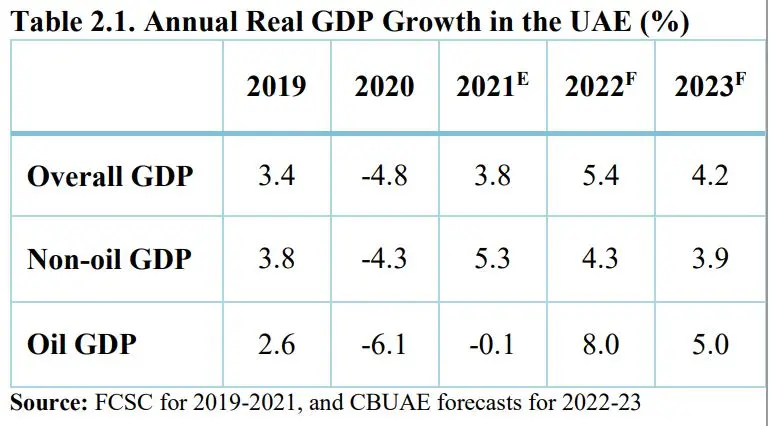PHOTO
The UAE economy is set to grow at its fastest pace in years on the back of higher oil production and commitment to expand its manufacturing sector, according to the central bank.
The country's overall real gross domestic product (GDP) rose by 8.2 percent year-on-year during the first quarter of 2022, driven by a sharp rise in oil production and improvement in non-oil GDP, the banking authority said in its latest Quarterly Economic Review.
The economy is on track to post a 5.4 percent growth in 2022, the highest since 2019, and 4.2 percent in 2023. This year's forecast is higher than the projections issued by the International Monetary Fund (IMF) last April.
"There is a probability for growth being stronger, driven by higher oil production and by the government commitment to double the size of the manufacturing sector by 2031," the report said.


Non-hydrocarbon sector
The central bank estimated that the country's non-hydrocarbon sector grew 6.1 percent year-on-year in the first quarter, supported by the easing of pandemic-related restrictions and recovery in travel demand. Non-oil GDP is forecast to expand by 4.3 percent in 2022 and 3.9 percent in 2023.
The report also highlighted that domestic consumption in the UAE has gone up during the first three months of the year, thanks to increases in employment and workers' salaries.
However, the country's consumer price index (CPI) inflation grew by 3.4 percent, surpassing the previous quarter's 2.3 percent. Inflation has been driven by the rise in transportation costs, which went up by 22 percent due to higher fuel, oil and car prices.
The IMF had forecast in April that the UAE economy could grow by 4.2 percent this year, higher than the previous forecast of 3.5%.
This year, the UAE government unveiled its industrial strategy and expressed commitment to invest AED10 billion ($2.7 billion) to double the size of the manufacturing sector in Abu Dhabi by 2031.
During the first quarter of the year, the UAE's oil production went up by 13% to 2.95 million barrels per day, following a decision by OPEC+ to boost production for all member states by more than 400,000 barrels per day.
(Reporting by Cleofe Maceda; editing by Seban Scaria)




















